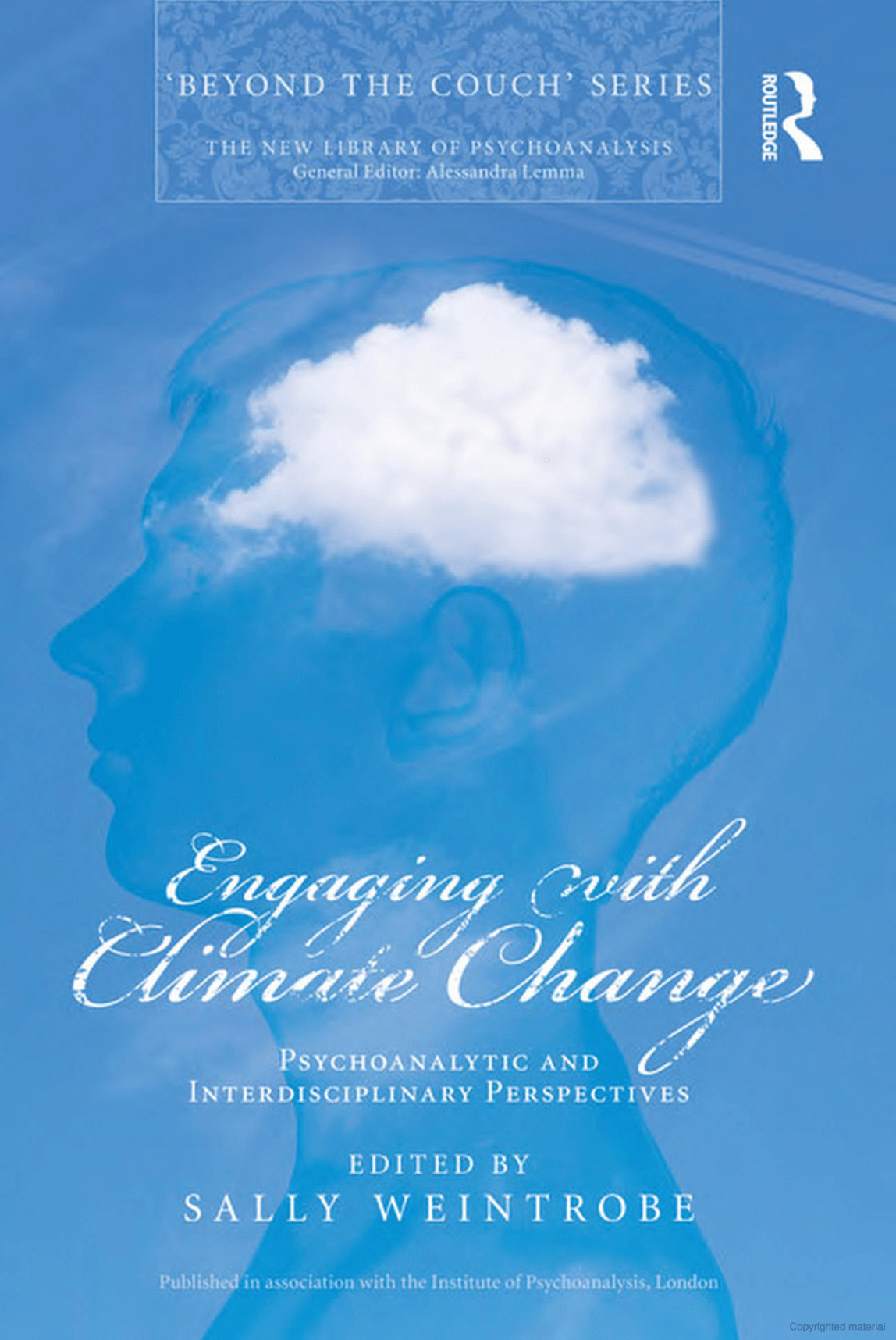BOOK REVIEW
by Richard B. Grose
ENGAGING WITH CLIMATE CHANGE: PSYCHOANALYTIC AND INTERDISCIPLINARY PERSPECTIVES
Edited by Sally Weintrobe, London: Routledge, 2013.
Before I read this book, which I heard about not long after it was published in 2013, I thought it would turn out to be a worthy effort to apply psychoanalytic and interdisciplinary thinking to the nightmare subject of climate change. But it seemed that such a book would inevitably be doomed by the fact that no one who refused to “engage with climate change” would pick it up, much less buy it or read it carefully. And yet, who else would be the target audience for it? For this reason, I expected a reading experience of futility.
Then I read the book.
It consists of ten chapters, seven of them followed by brief commentaries. The chapters and the commentaries are written by psychoanalysts, psychotherapists, scholars in the social sciences, ethics, and philosophy; climate activists, a former advertising executive, and a climate scientist. One surprising pleasure of the book is to see psychoanalytic theory (here mainly Kleinian) used to such good effect on a subject of such importance, including by nonanalysts. Reading this book, one would hardly guess that psychoanalytic ideas had long since been relegated to the dustbin of Western intellectual life.
The level of writing and thinking in most of the chapters is very high. (The one chapter which is an exception to this overall high level is corrected by its two commentaries). The writing evocatively shows connections between intrapsychic dynamics and the brute facts of climate change denial and, beyond that, indicates the baseline cultural attitudes that make accepting climate science difficult for so many.
For example, Paul Hoggett, a professor of politics and a psychoanalytic psychotherapist, begins his chapter “Climate Change in a Perverse Culture” by citing Freud’s late concept of disavowal to understand the fact that doubt about the urgent reality of climate change increases even as the evidence — in the form of ever more dire scientific reports — mounts. Disavowal, the state of simultaneously acknowledging and denying unpleasant facts, serves him (1) to add psychological depth to the account of climate change denialism and (2) to expand his view from the individual to the social plane. In his breathtaking chapter, he shows perverse states of disavowal to characterize not only the basic dynamic of denialism but also whole sectors of contemporary economy, culture, and governance. In one single paragraph, he cites both pedophilia and “trickle-down theory” as examples of perverse pleasure — “in which the subject confuses his individual pleasure with the other’s good.” (p. 61) Such connections between psychopathology and social pathology abound, and they are advanced on the basis of wide reading and close arguing.
They abound not only in this chapter but throughout the book. As one reads, one feels the book’s power in the interpenetration of theories of individual psychodynamics and those of societies and cultures. Because this theoretical resonance builds in the course of the book, one feels its particular force in the penultimate chapter by Sally Weintrobe, which puts forward terms that link the inner and outer worlds. For example, she suggests the term “landscape” to denote “a place in the internal world of the psyche.” (203) She argues for the term by saying, “Internal representations of landscapes have their roots in our physical world.”
Our landscapes are socially determined to a considerable extent and we express and also develop different aspects of our identity within the setting of these landscapes. We are already socially placed within landscapes, we find ourselves placed within landscapes, and we also find our selves in landscapes. Diversity of inner landscapes is vital to forming an identity sufficiently rich to promote well-being and feeling alive as a person. (p. 204)
In this passage, Weintrobe shows the interpenetration of psychic and ecological health, pointing to the dawning truth that neither can be truly understood without the other.
Where, then, does the power of this book take the reader? It seems to me that it can go in multiple directions. It can serve as a guidebook to those who are attempting to communicate with the public on the urgency of climate change. It contains hints for psychoanalytic writers on the powerful synergies of psychodynamic, social, and cultural theorizing. Perhaps most fundamentally, it offers the reader a powerful, multifaceted account of the psychic and social realities underlying the incommensurable nightmare we are entering. And as such, it stands in the service of self-knowledge, here understood as knowledge of the unconscious psychic forces in society that, as of the writing of this review, still have humanity in their grip. Whatever the eventual effect on other actors, this contribution to self-knowledge exemplifies the basic purpose of psychoanalysis even as it orients us outward, toward a world that desperately needs our determined efforts. ■
- Richard Grose, PhD, is an associate member of IPTAR, where he serves as secretary on the board of directors and teaches in the respecialization program. He is a member of ROOM’s editorial board and a co-chair of the Room Roundtable. He has a private practice in psychotherapy and psychoanalysis in Manhattan.
-
Email: groser@earthlink.net
ROOM is entirely dependent upon reader support. Please consider helping ROOM today with a tax-deductible donation. Any amount is deeply appreciated. |





